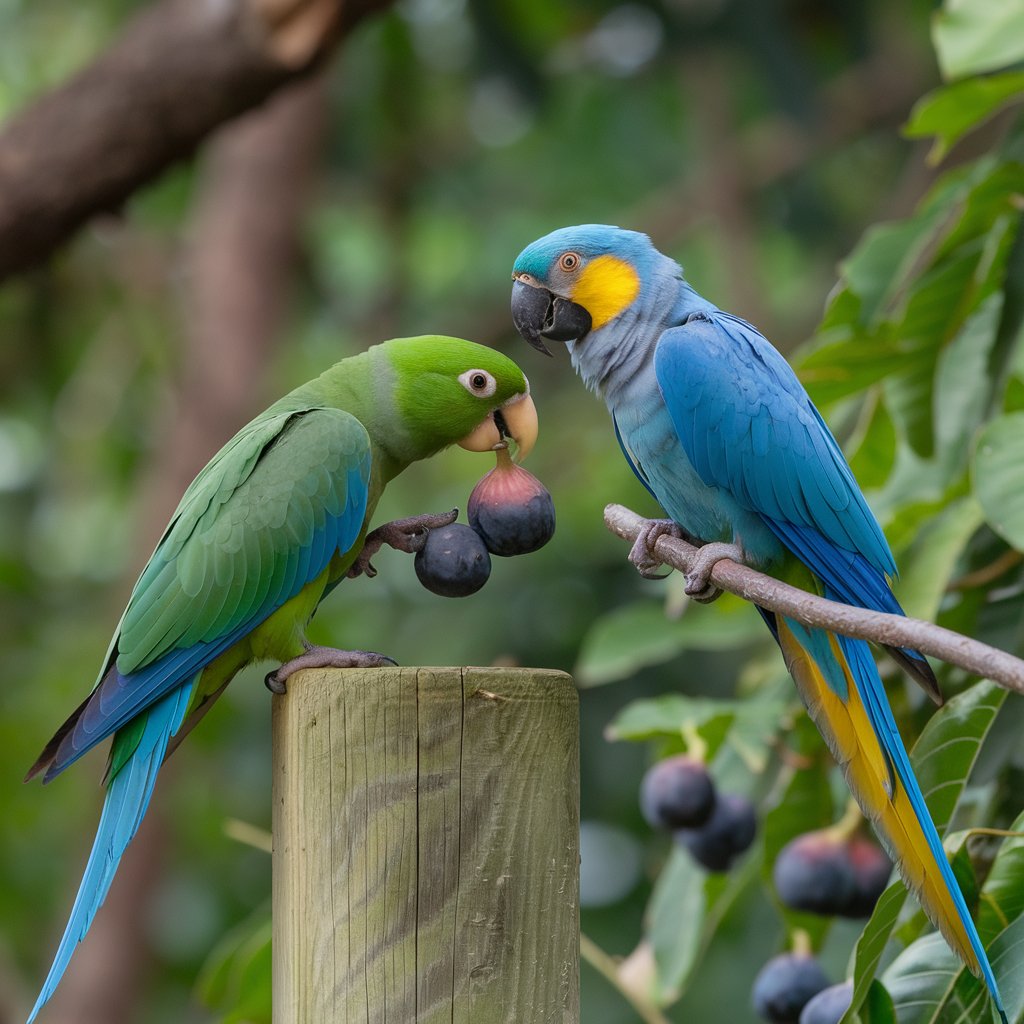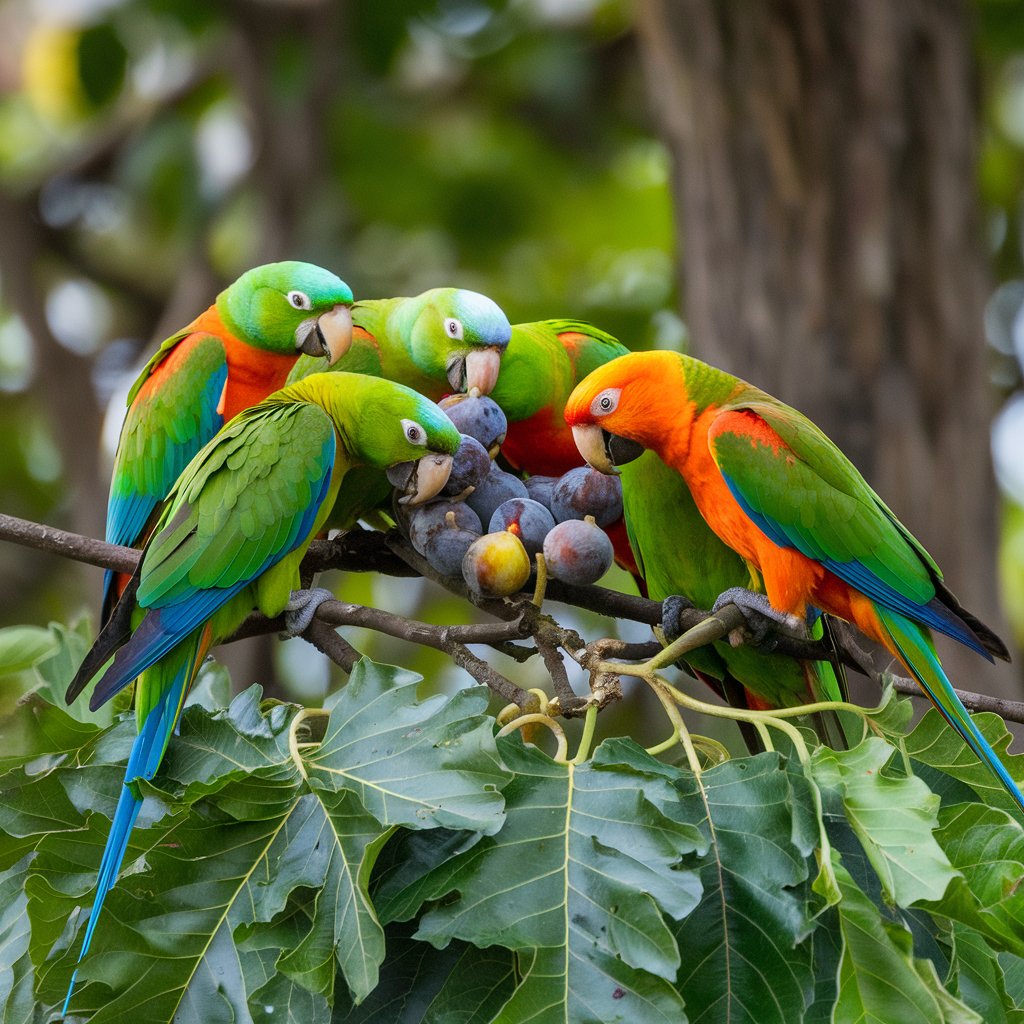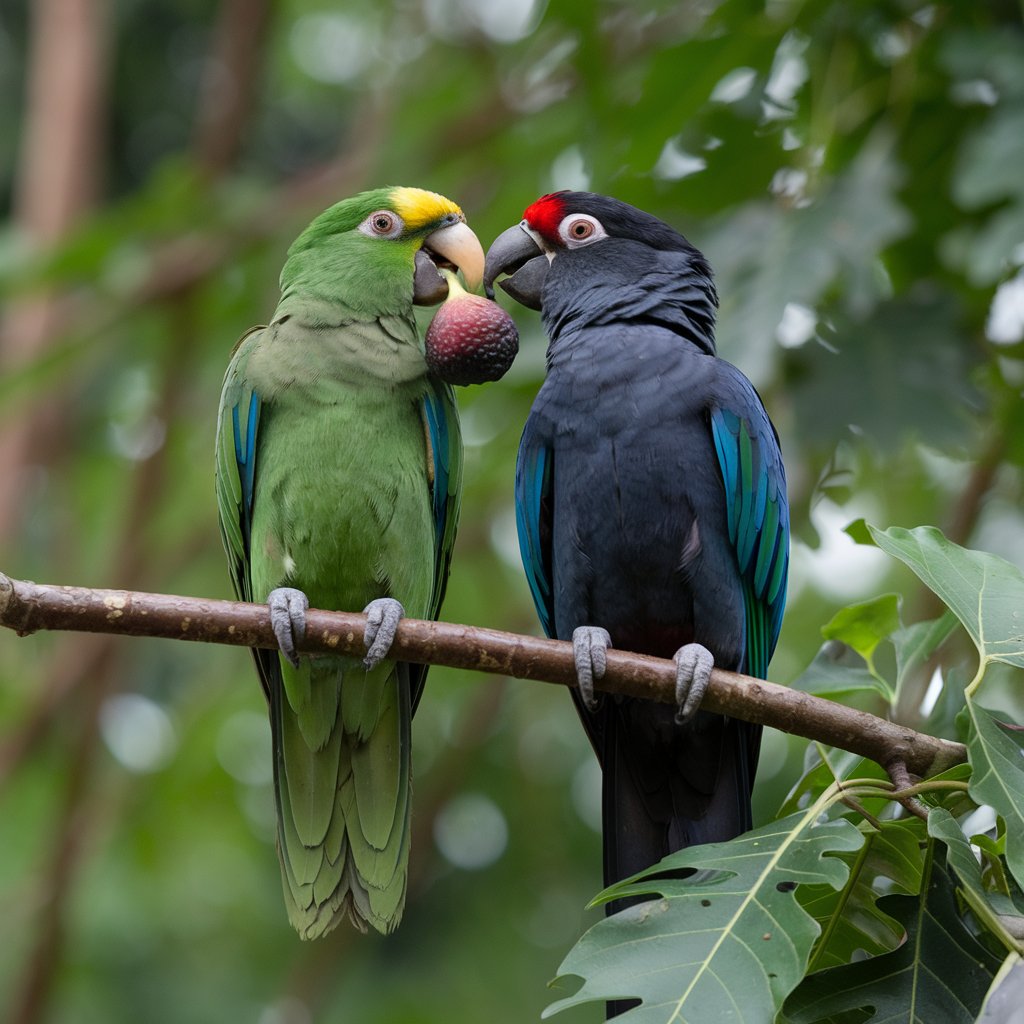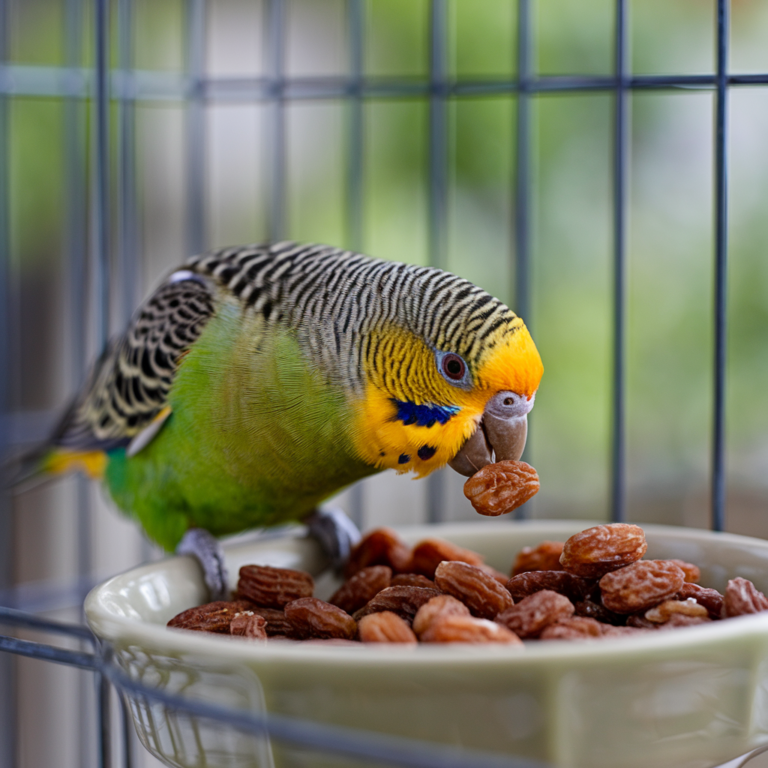Can parrots eat figs?, As a parrot owner, I’m always looking for healthy treats that can add variety to my bird’s meals. Parrots can safely eat figs, and these fruits provide several nutritional benefits that can add to your bird’s diet.

I’ve found that many parrots enjoy figs, though reactions can vary from bird to bird. Some birds might gobble them up eagerly, while others might need time to warm up to this new food. There’s even a species called the fig parrot that, as the name suggests, has a natural affinity for these fruits. Size matters when serving figs – for smaller birds like parrotlets, cutting them into smaller pieces makes them easier to manage.
Key Takeaways
- Figs are safe for parrots to eat and provide valuable nutrients as part of a balanced diet.
- Portion sizes should be adjusted according to your parrot’s size, with smaller birds needing figs cut into manageable pieces.
- While most parrots enjoy figs, individual preferences vary, so introduce them gradually alongside other healthy fruits and vegetables.
Nutritional Benefits of Figs for Parrots
Figs offer several important nutrients that can benefit your parrot’s health. These sweet fruits contain essential vitamins, minerals, and fiber that support overall wellbeing when included as part of a balanced diet.
Vitamin A and Beta Carotene Content
Figs provide valuable nutrients for parrots, especially vitamin A which is crucial for maintaining healthy vision, immune function, and proper growth. Beta carotene, which converts to vitamin A in the body, gives figs part of their nutritional power. This conversion helps prevent vitamin A toxicity while ensuring your bird gets enough of this essential nutrient.
Many parrots in captivity suffer from vitamin A deficiency, making figs a helpful dietary addition. I recommend offering small portions of fig as a supplement to their regular diet. The rich beta carotene content supports:
- Eye health
- Immune system function
- Respiratory system health
- Healthy skin and feathers
Fresh figs generally contain more bioavailable nutrients than dried ones, making them the preferred option.
Calcium and Fiber for Parrot Health
Figs are rich in calcium, potassium, magnesium, copper, iron, and manganese. Calcium is particularly important for parrots as it prevents calcium deficiency, which can lead to weak bones, egg binding in females, and seizures. The calcium in figs helps maintain bone density and proper muscle function.
The high fiber content in figs supports digestive health in parrots. This dietary fiber helps with:
- Regular bowel movements
- Prevention of constipation
- Healthy gut flora
- Proper nutrient absorption
I’ve found that the natural sugars in figs make them appealing to most parrots, which helps when introducing new nutritious foods. The fiber also helps slow the absorption of these sugars, preventing blood sugar spikes.
Safe Fruits and Vegetables for Parrots
Providing the right fruits and vegetables is essential for your parrot’s health and wellbeing. Knowing which foods are safe and which could be harmful will help you create a balanced and nutritious diet for your feathered friend.
Common Safe Foods
Parrots can enjoy a wide variety of fruits and vegetables that provide essential nutrients. Figs are completely safe for parrots and offer nutritional benefits that complement their daily diet. I recommend offering dark-skinned figs, which are particularly enjoyed by smaller birds like mousebirds when cut into manageable pieces.
Other safe fruits include:
- Apples (remove seeds)
- Bananas
- Blueberries and other berries
- Grapes (especially dark varieties)
- Cherries (pits removed)
- Watermelon (flesh, seeds, and rinds are all safe)
For vegetables, I suggest these parrot-friendly options:
- Kale (excellent source of vitamins)
- Celery (cut into small pieces)
- Cabbage (in moderation)
- Bell peppers
- Carrots
- Broccoli
Foods to Avoid
While many fruits and vegetables are beneficial, some common foods can be toxic to parrots. I never feed my parrot avocado as it contains persin, which is toxic to birds and can cause serious health problems or even death.
Other foods to absolutely avoid include:
- Garlic and onions: These contain compounds that can damage red blood cells
- Mushrooms: Can cause digestive issues and potential toxicity
- Apple seeds: Contain small amounts of cyanide (though the flesh is safe)
- Chocolate: Contains theobromine, which is toxic to birds
- Caffeine: Found in coffee, tea, and some sodas
I also keep my parrot away from alcoholic beverages, salty foods, and processed foods with artificial additives. When introducing new foods to your parrot’s diet, start with small amounts to ensure they don’t have adverse reactions.
Incorporating Figs into a Parrot’s Diet
Figs can be a nutritious addition to your parrot’s menu when served properly. They offer natural sweetness and important nutrients that many birds enjoy.

A Balanced Approach to Fresh Foods
When adding figs to your parrot’s diet, moderation is key. I recommend offering figs as part of the 20-30% fresh food portion of their diet, alongside other fruits and vegetables.
Parrots can safely eat figs and many species enjoy them tremendously. For smaller birds, I suggest cutting figs into manageable pieces to prevent choking hazards. This is especially important since figs can be sticky.
Some birds, like mousebirds, particularly enjoy dark-skinned fig varieties. When introducing figs, start with small amounts to ensure your parrot tolerates them well.
Figs should complement a foundation of quality pellets (70-80% of diet) and other fresh foods. I’ve found that rotating figs with other soft foods prevents dietary boredom while maintaining nutritional balance.
Understanding the Eclectus Diet
Eclectus parrots have unique dietary needs compared to other parrot species. Their longer digestive tract requires special consideration when incorporating figs and other fruits.
For Eclectus parrots, I recommend offering figs as part of a diverse fruit selection that makes up about 20-25% of their diet. These birds particularly benefit from the natural sugars and fiber in figs.
Asiatic parrots like Indian Ringnecks are canopy feeders that naturally consume fatty fruits in the wild. For these birds, figs align well with their natural dietary preferences.
When feeding figs to Eclectus parrots, I ensure they’re balanced with adequate vegetable protein sources like legumes and properly cooked beans. This helps maintain their protein requirements while enjoying fruit treats.
Potential Health Concerns and Fig Consumption
While figs are generally safe for parrots, certain health considerations should be kept in mind to ensure your bird’s wellbeing when including this fruit in their diet. Proper portion control and preparation are key factors in preventing potential issues.
Toxicity and Allergy Considerations
Figs themselves are not toxic to parrots and are completely safe for them to consume. However, I always recommend introducing any new food gradually to watch for allergic reactions. Some parrots may show individual sensitivities.
Unlike toxic foods such as rhubarb, figs don’t contain harmful compounds. When selecting figs, I avoid any that appear dark or show signs of mold, as fungal infection could develop if parrots consume contaminated fruit.
Wild figs might contain small wasps that pollinate them, but these pose no health risk to parrots. Commercial figs are generally processed without these insects present.
Maintaining Optimal Digestive Health
Excessive fig consumption may cause digestive issues for parrots due to their high fiber content. I limit fig portions based on my parrot’s size – smaller birds need correspondingly smaller amounts.
I’ve found that many parrots initially look at figs with suspicion. One trick is to have a brave bird demonstrate they’re safe to eat, which encourages others to try them.
For balanced nutrition, I pair figs with whole grains and protein sources. This prevents digestive upset that might affect my bird’s sleeping patterns or overall health.
Unlike processed foods, fresh figs provide natural nutrients without artificial additives that could potentially harm a parrot’s sensitive digestive system.

Frequently Asked Questions
Many parrot owners have questions about feeding figs to their birds. I’ve compiled answers based on veterinary guidance and expert knowledge to help you make informed decisions about including this nutritious fruit in your parrot’s diet.
Is it safe for parrots to consume figs regularly?
Yes, figs are completely safe for parrots to eat on a regular basis. Parrots of all sizes can eat figs, though portion sizes should vary based on the bird’s size.
I recommend offering figs as part of a varied diet rather than daily. Like all fruits, figs should make up only about 20-25% of your parrot’s overall diet to ensure balanced nutrition.
What are the benefits and risks of feeding dried figs to parrots?
Dried figs provide concentrated nutrients and natural sugars that can give your parrot energy. They’re also easier to store and have a longer shelf life than fresh figs.
However, dried figs contain much higher sugar content than fresh ones, which can lead to obesity and other health issues if overfed. I suggest offering dried figs sparingly as occasional treats rather than regular food items.
The sticky texture of dried figs can also potentially cause issues with your bird’s beak if not cleaned properly after eating.
Can feeding figs along with carrots be part of a healthy diet for parrots?
Absolutely! Combining figs with vegetables like carrots creates an excellent nutritional profile for parrots. Carrots provide vitamin A and beta-carotene while figs offer fiber and natural sugars.
This combination gives your parrot a good mix of nutrients. I recommend varying the fruits and vegetables you offer to ensure your bird receives a wide range of vitamins and minerals.
Should the seeds in figs be removed before giving them to parrots?
Unlike some fruit seeds, fig seeds are tiny and completely safe for parrots to consume. There’s no need to remove them before feeding.
Fig seeds can actually provide additional fiber which aids in digestion. Many birds in the wild eat figs with seeds as part of their natural diet without issues.
Are there any particular fruits that should be avoided in a parrot’s diet?
Yes, some fruits are harmful to parrots. Avocado is toxic to parrots and should never be fed. Apple seeds contain cyanide and must be removed before feeding apples.
Citrus fruits should be limited as they can cause stomach upset in some birds. I also recommend avoiding any fruits with pits or large seeds unless you’ve removed them first.
How does the nutritional value of dates compare to figs for parrot consumption?
Both dates and figs are acceptable treats for parrots. Dates and figs are fine to include in a parrot’s diet in moderation.
Dates are higher in calories and sugar than figs, so they should be given less frequently. Figs provide more fiber and slightly less sugar, making them a better option for regular feeding.
I find that many parrots show preference for one over the other, so you may need to introduce both to discover what your bird prefers.

